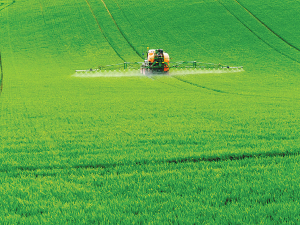While the new government is sure to “tinker” with the previous administration’s emissions policy, a recent visit to New Zealand by a group of ten UK-based technology companies, highlighted where things might be heading.
Lincoln-based – the one in the UK – Crop Intellect certainly got ears twitching, by claiming its technology lets crops turn pollution into fertiliser. This is achieved by using a new technology that captures air pollution and uses sunlight to convert it into nitrate on the leaf surface of a crop.
Called R-Leaf, a process known as photocatalysis breaks down nitrous oxide and turns it into an essential crop nutrient. This offers the potential to reduce farm emissions and ultimately, the industry’s reliance on synthetic nitrogen.
Against a background of rollercoaster fertiliser markets and environmental concerns, with the promise of more volatility still to come in the case of the former. The technology is being promoted as a development that will allow farmers to make better use of nitrogen fertiliser, while reducing the greenhouse gas emissions associated with its use.
Classed as a fertiliser, R-Leaf is based on titanium dioxide and comes in a liquid formulation that also contains manganese, molybdenum and zinc. It can be applied through a standard farm sprayer to crop foliage, either on its own or as part of a tank mix. Once applied, it uses sunlight to convert atmospheric nitrous oxide into nitrate, which the company says helps to provide the plant with a constant supply of the nutrient.
The patented photocatalyst technology contained in R-Leaf has been designed to work under normal daylight conditions, rather than needing high intensity light usually associated with such chemical reactions, This allows it to react with nitrous oxide in field conditions, breaking the pollutant down in to nitrate, carbon dioxide and water – all of which are required by the plant.
Jeremy Hitcham, commercial manager at Crop Intellect, says the R-Leaf is a significant development for the industry’s net-zero ambitions, not only helping to improve nutrient use efficiency on farms.
“It also has a role in reducing air pollution. In the future, its use should allow carbon credits to be produced, so that they can be monetised if required.”
R-Leaf’s potential to contribute towards reducing climate change has been validated at 5.4t/ha of carbon dioxide equivalent when used at a rate of 2 litres/ha, with verification coming from Climate Impact Forecast tool.
Hitcham suggests there are two ways in which R-Leaf can be used on-farm. The first to reduce bagged nitrogen usage by 25% and let R-Leaf provide the rest, so that yields are maintained. The second is to maintain normal farm practice and apply the same amount of nitrogen, with R-Leaf being used to provide additional yields.
Currently being applied to many thousands of hectares, R-Leaf currently costs £25/litre, with split applications of 2 litres/ha being recommended for cereals crops. Applications are made at growth stage T1 and T2, meaning a total cost of £50/ha.
The second application is needed because R-Leaf doesn’t move once it has been applied, so a growing plant producing new leaves benefits from the follow-up as older, treated leaves become shaded.
The product is included in Tesco’s largescale commercial trial on nitrogen fertiliser use. R-Leaf is one of eight alternative fertiliser products being tested by the supermarket, with early recognition in the form of an Agri T-Jam Award for Innovation.


















